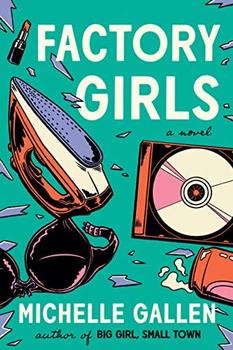Summary | Excerpt | Reviews | Beyond the Book | Read-Alikes | Genres & Themes | Author Bio

This article relates to Factory Girls
 The history of mostly separate education for Catholics and Protestants in Northern Ireland is a complicated one, existing alongside discriminatory and segregated employment, marriage and housing laws. In Michelle Gallen's Factory Girls, school is one of the most significant areas where the period of intense sectarian conflict between Protestants and Catholics known as the Troubles (1968-1998) imposes on the daily lives of those who have little agency — the children of Northern Ireland.
The history of mostly separate education for Catholics and Protestants in Northern Ireland is a complicated one, existing alongside discriminatory and segregated employment, marriage and housing laws. In Michelle Gallen's Factory Girls, school is one of the most significant areas where the period of intense sectarian conflict between Protestants and Catholics known as the Troubles (1968-1998) imposes on the daily lives of those who have little agency — the children of Northern Ireland.
Though Catholic protagonist Maeve Murray attended a nominally integrated school (in other words, one that accepted both Catholic and Protestant students), she notes that this was only for show, as in practice Catholics would not dare attend a Protestant school and vice versa.
Until the late 18th century, Catholic children in Ireland were banned from formal education. Instead, they attended their own "hedge schools," which were illegal and seen as a threat to the political and social status quo of English control in the country. Following the Act of Union in 1801, which united Great Britain (England and Scotland) with Ireland and brought Ireland under the rule of Westminster, restrictions on Catholic education were relaxed. The first attempts at multi-denominational schools came in 1812, due to grants being offered to integrated institutions, but some of the establishments that first appeared to be neutral towards students' religion were later found to be proselytizing. In 1831, Ireland established a National School system to provide non-denominational education for all Irish children. This early attempt at cross-faith integration was met with volatile, intense opposition from both sides and schools ultimately remained mostly denominational. Upon the Partition of Ireland in 1921, schools in Northern Ireland were encouraged to operate under state control in exchange for funding under a majority-Protestant parliament; the Catholic Church chose to maintain authority over their own schools.
For more than half a century following partition, denominationally separate schooling stayed the unchallenged norm in Northern Ireland. In the late 1970s, some parents concerned about the ongoing political violence of the Troubles and the contributing effects of segregation began to advocate for integrated education. By the 1990s, some formerly segregated schools were attempting integration. However, despite official ceasefires in the '90s, followed by the St. Andrews Agreement in 2006 (which made way for the restoration of Northern Ireland political institutions), grassroots efforts to heal the rifts emphasized during the Troubles continue today, and schools in Northern Ireland remain largely segregated.
Over the years, educators and students have made their own attempts to turn their denominationally separate schools into spaces for real reconciliation, including extracurricular activities and field trips. This is humorously depicted in Season Two of the 1990s-set series Derry Girls, which features a "Friends Across the Barricade" peace initiative event. The Guardian's 2021 Hugo prize for young adult political writing went to Abby Wallace for her op-ed on her experience attending an integrated school in Northern Ireland. The subject of integration continues to be contentious but, as Wallace writes, it is an urgent issue that must be addressed.
Sion Mills Public Elementary School, one of the first integrated schools in Northern Ireland (opened in 1879). Photo by Kenneth Allen (CC BY-SA 2.0)
Filed under Places, Cultures & Identities
![]() This article relates to Factory Girls.
It first ran in the January 18, 2023
issue of BookBrowse Recommends.
This article relates to Factory Girls.
It first ran in the January 18, 2023
issue of BookBrowse Recommends.
Being slightly paranoid is like being slightly pregnant – it tends to get worse.
Click Here to find out who said this, as well as discovering other famous literary quotes!
Your guide toexceptional books
BookBrowse seeks out and recommends the best in contemporary fiction and nonfiction—books that not only engage and entertain but also deepen our understanding of ourselves and the world around us.